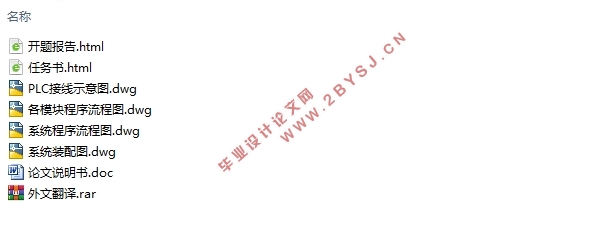四容水箱实验装置PLC自动控制系统设计
无需注册登录,支付后按照提示操作即可获取该资料.
四容水箱实验装置PLC自动控制系统设计(任务书,开题报告,外文翻译,论文说明书13000字)
摘 要
本文介绍了四容水箱实验装置PLC自动控制系统的设计,针对控制系统的总体设计、硬件设计与组态、软件的配置、具备的功能、变频调速的PID控制过程和调节功能做了深入的研究。通过PROFIBUS-DP的通信方式控制西门子G110变频器,通过改变变频器的频率大小来改变水泵电机的转速,从而调节水泵的给水量,最终实现对水箱液位的控制[1]。
同时,利用WINCC软件设计四容水箱的监控画面,STEP7编写程序,借助数据采集模块、PID控制算法以及WINCC组态软件,来实现对水箱液位的精确现场模拟控制。设计并搭建过程控制系统,完成控制系统的组态实验以及结果分析。此操作方法易于掌握,广泛的应用于解决工业生产过程中液位控制的问题。除此之外,此控制系统不但可以满足工业生产的需求,并且未来的市场前景巨大。
关键词: 液位控制 四容水箱 PLC PID控制算法
Design on laboratory apparatus of quadruple tank control system
Abstract
This paper describes the design of four experimental device - tank PLC automatic control system for the overall design of the control system design and configuration of hardware, software configuration, have the function, frequency of PID control process and the regulatory function to do a more in-depth the Dynasty. PROFIBUS-DP via communication control to M440 inverter size by changing the motor speed control AC pumps to achieve the water level control.
Meanwhile, WINCC software design four - tank monitor screen, control procedures with T-type language, with data acquisition modules, PID control algorithm and WINCC configuration software, and ultimately accurate control of the water level of. Design and build process control systems, complete configuration test and results analysis control system. This method is easy to grasp, is widely used in industrial processes to solve problems in level control. In addition, the control system will not only meet the needs of industrial production, and huge future market prospects.
Key words: quadruple tank ;the liquid level control ;PLC;PID control algorithm

目录
摘 要 I
Abstract II
第一章 绪论 1
1.1研究背景及意义 1
1.2 国内外发展现状及趋势 2
1.2.1国内外多容水箱的研究现状 2
1.2.2液位控制系统的发展与应用 2
1.2.3液位控制的前景 3
1.3 本文研究内容 4
第二章 四水箱实验装置概况和控制系统软件 5
2.1 实验装置概述 5
2.2 实验对象系统 6
2.2.1四容水箱液位系统 6
2.2.2检测机构系统 7
2.2.3 执行机构系统和辅助系统 7
2.3 实验系统软件 8
第三章PLC的硬件设计及选型 9
3.1 S7-300 PLC简介 9
3.2 电源模块选型 9
3.3 CPU选型 10
3.4 数字量模块选型 10
3.5 模拟量模块选型 10
3.6 机架 11
第四章 四容水箱控制系统软件设计 12
4.1 STEP7介绍 12
4.2实验装置数学模型的建立 12
4.3 基本的PID控制实验设计 13
4.3.1 PID控制器的参数整定方法 14
4.3.2单回路液位PID控制实验设计 16
4.3.3 双容水箱液位串级PID控制实验设计 17
4.4 液位控制系统程序设计 13
第五章WinCC与远程监控 20
5.1 WinCC介绍 24
5.2 远程监控 24
第六章 总结与展望 28
6.1 总结 28
6.2 展望 28
参考文献 29
致 谢 30
